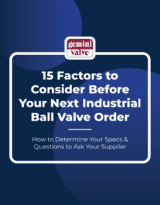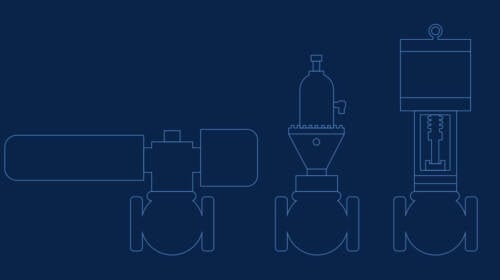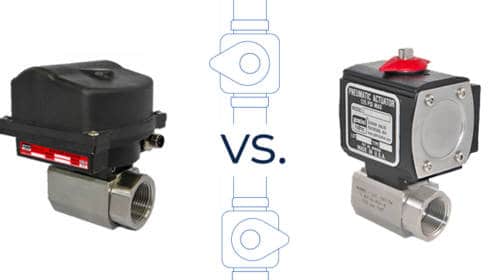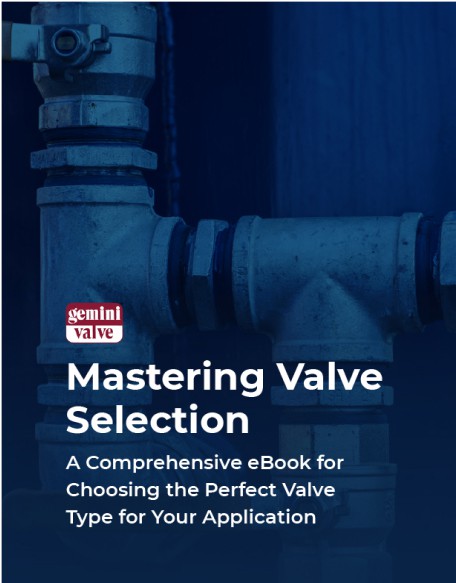Gas Ball Valves: What Are They & When Are They Used?

Ball valves are essential players in any application requiring media control across various industries. Since fluid and gas have different regulatory properties and requirements, certain design variations make certain valves suitable for different types of media.
In this post, we provide an in-depth explanation of gas ball valves, how they work and where to use them.
What Are Gas Ball Valves?
Gas ball valves are quarter-turn valves with quick shut-off capabilities, designed to meet the requirements of specific gas media applications. They come in various configurations that make them ideal for natural gas, manufactured gas, hydrocarbon, vapor and other gas-based systems.
While standard ball valves are generally suitable for controlling the flow of gas media, gas ball valves are custom-built to deliver superior performance in systems where precision and reliability are critical. The valve material is application-dependent, though stainless steel is the most common choice for applications in which corrosion poses a risk.
Industry standards play a crucial role in informing the design and ensuring the effectiveness of gas ball valves. In the U.S. and Canada, gas ball valves are rated for either indoor or outdoor use. These standards in particular ensure that gas valves perform reliably in certain environmental conditions.
Key Components and Working Mechanism
Ball valves for gas applications incorporate the same components and characteristics as standard ball valves, but may include additional design elements to improve performance and safety in specific gas media applications. Gas ball valve designs may include:
- Fire-safe designs: For gas media where fire safety is a concern, some ball valves may include enhanced failsafes or sealing to increase safety.
- Anti-static devices: To mitigate the risk of static electricity buildup, which can be a concern in gas applications, some gas ball valves include anti-static devices. These devices provide a path for static charges to dissipate, reducing the potential for sparking.
- Vent ports: Vent ports may be incorporated to release trapped gas in the valve body when it is closed, ensuring complete isolation.
- Tamper-proof or locking handles: In critical gas applications, ball valves may feature tamper-proof or locking handles to prevent unauthorized or accidental operation.
- Pilot taps: Some gas ball valves may be equipped with pilot taps for monitoring pressure. These small side ports allow for installation of additional components such as pressure gauges or pressure switches.
Gas Ball Valves Applications
Though standard ball valves are suitable for many gas applications, gas ball valves provide the safety, durability and integrity needed to ensure utmost safety and effectiveness. Any piping system that carries combustible gas requires gas ball valves.
Gas ball valves are used for the quick on/off control of:
- Natural gas lines
- Gasoline systems
- Liquefied petroleum gas
- Chemical vapors
- Gas/air mixtures
Gas ball valves also appear in household applications such as boilers, water heaters, furnaces, fireplaces and gas stoves.
Choosing the Right Gas Ball Valve
When choosing the right type of gas ball valve for a specific application, you need to consider various factors to ensure optimal performance and longevity:
- Performance requirements: Consider the flow rates, pressure and temperature ranges of the gas system, and select a gas ball valve rated for those specific conditions. For example, if the system operates at high pressure, choose a valve designed to withstand highly pressurized media.
- Material compatibility: Ensure that the materials used in the construction of the gas ball valve can withstand prolonged contact with the service medium. This helps to prevent degradation and extend the valve’s life. When in doubt, consult the Cole-Parmer Chemical Compatibility Database.
- Chemical characteristics of service medium: It’s also important to understand the chemical characteristics of the gas or service medium and how they will affect the valve materials. For example, for piping systems with traces of sour gas, choose gas ball valves with PTFE seats. PTFE is inert against chemicals and is less likely to corrode compared to metal-seated valves.
- Abrasive media and contaminants: Likewise, it’s important to choose a gas ball valve that can withstand the potential damage caused by abrasive substances to prevent premature valve failure. While gasses are generally not considered abrasive in the same way solid particles in liquids can be, the presence of dust or suspended particulates within the gas media can create abrasive properties.
- Maintenance requirements: Ball valves in critical gas pipelines should be easy to maintain or require minimal maintenance interventions. Valves that are easy to access, disassemble and reassemble can save time and resources during a halt in operations.
- Industry standards and certifications: Verify that the selected gas ball valve complies with industry standards and certifications relevant to the application. This ensures that the valve can deliver on quality and safety requirements.
- Consult with experts: If in doubt, consult with industry experts, engineers or manufacturers who specialize in gas ball valves. They can provide valuable insights and recommendations based on their expertise and experience.
By carefully considering these factors, you can choose a gas ball valve that not only meets the immediate requirements of your application but also ensures long-term reliability and minimal maintenance.
The products in the General Industrial series from Gemini Valve are suitable for most gas applications; more demanding applications may require special customizations.
Advantages and Disadvantages of Gas Ball Valves
By using ball valves specifically rated for gas applications, you have the advantage of the following benefits:
- Excellent shutoff for a tight and reliable seal
- Efficient flow control
- Ability to withstand high pressure
- Durable construction
- Easy to clean, maintain and inspect
- Simple operation with quarter-turn handle
- Cost-effective compared to other valve types
On the other hand, some characteristics may make gas ball valves unsuitable for some scenarios:
- They may erode in high-velocity flow, so they are not ideal for throttling applications.
- Incompatibility and incorrect use with certain media can lead to accelerated wear.
Choosing the right ball valve is crucial for any application, so it’s important to know the specific advantages, constraints and requirements when sourcing gas piping system components. To ensure optimal performance and longevity, it’s essential to consult with experts and select valves that meet specific application needs.
Gemini Valve offers a range of gas ball valves suitable for various systems, ensuring safety, durability and integrity. If you’re looking for a cost-effective valve solution that guarantees excellent shut-off and efficient flow control, place an order with us today.
Ready to Place an Order? Read This First.
Here are 15 factors to consider before your next industrial ball valve order.
15 Factors to Consider Before Your Next Industrial Ball Valve Order
This guide includes everything you need to know before placing your next industrial ball valve order.





